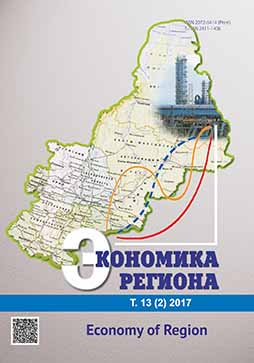Инфляция в современной России: теоретические основы, особенности проявления и региональный аспект
Inflation in Modern Russia: Theoretical Foundations, Specific Features of Manifestation and Regional Dimension
Author(s): Vladimir Vladimirovich Ilyashenko, Lyudmila Nikolaevna KuklinaSubject(s): Economy, Geography, Regional studies
Published by: Институт экономики Уральского отделения Российской академии наук
Keywords: inflation; demand-pull inflation; cost-push inflation; level of inflation; consumer price index; monetarist theory; money supply; exchange rate; aggregate demand; anti-inflation policy; rate of intere
Summary/Abstract: The purpose of the article is to characterize the development and specific features of inflation in Russia on the basis of its theoretical justification and practical analysis. The article discusses the monetarist and Keynesian approaches to the characterization of inflation. The paper shows that the equation of exchange from the quantity theory of money, which is the basis of the monetarist theory of inflation, does not allow to make an unambiguous conclusion about the direct relationship between money supply and price level in the economy. The authors give the theoretical substantiation of cost-push inflation from the position of microeconomic theory, which is denied by the representatives of the monetarist school. We characterize the specific features of inflation in the period of market transformations in Russia. The article shows the considerable role of the cost factors of cost-push inflation: the monopolization of the economy, rise in the prices of energy and raw materials. There is an absence of the direct relationship between inflation and money supply growth in large part of the period of the 2000. The authors determine the dependence between the exchange rate and inflation in the Russian economy, which is most evident during periods of significant devaluation of the national currency, as a rule, associated with a significant increase in world oil prices. The paper notes that the significant decline in aggregate demand that occurred in Russia in recent years have reduced the level of inflation in 2016. Despite this, the reduction of inflation and its transformation to slow cost-push inflation was combined with negative consequences for the economy: the decrease of investments and production development, reduction of the living standards of the population. The authors conducted the analysis of inflation on the level of the subjects of the Russian Federation, which has confirmed the significant role of causes of cost-push inflation in the economy. The research has led to the conclusion about the appropriateness of measures on the stimulation of aggregate demand and the development of the national economy by reducing interest rates, increasing investment activity, developing competition and efficiency of antitrust regulation.
Journal: Экономика региона
- Issue Year: 13/2017
- Issue No: 2
- Page Range: 434-445
- Page Count: 12
- Language: Russian

